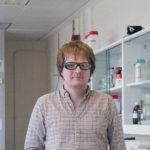-
Asked by anon-377686 to Martin M, Kirsty R, Erin Pallott, Clara Ferreira, Bruno Silvester L, Alexander dB, Paulo on 15 Feb 2024. This question was also asked by anon-377679, wake1eats.0
-
Clara Ferreira answered on 15 Feb 2024:
I work in the cancer area – so my answer will probably only apply to this area (I am definitely not a specialist in other areas; probably because I focus too much on this one! 🙂 ).
The first thing you need to do is to read a lot – you will find something that people never stopped to research. You pick up on it and you read lots about it – then you set up a protocol to make sure that you can study that very well.
I will give you an example, it is probably easier.
I work with a specific type of cancer – neuroendocrine cancer (really long name, I know) and the way that they live is based on their receptors (a little thing at the top of the cells that chooses what is important) – the name of these receptors and somatostatin receptors (another big word, I know!). People found in the past that we have 5 types of somatostatin receptors (number 1, 2, 3, 4, and 5), but most of the therapies that we offer are about numbers 2 and 5. So, I am trying to look for the other types and see what happens with them.
So, I use something called “cell lines” (so many big words, I am not doing very well on this!) and they work in the same way as a tumor, but we can just buy them from a company without seeing how they react when I try to play with the receptors 1, 3 and 4.
I also need to have in mind that lots of people around the world do research and they might be doing it about the same area as yours – so, you need to make sure that you read what they do to make sure that you are up to date.
-
-
Erin Pallott answered on 15 Feb 2024:
I work in “basic biology”. Which doesn’t mean it’s simple, but that I study exactly how things work. I study how mucus is made and how it changes during infection. So I don’t personally work in looking for cures and treatments, but the information I find can help clinical researchers and drug developers.
-
Bruno Silvester Lopes answered on 16 Feb 2024:
By doing a lot of research. I work on how bad bugs fight drugs and I love looking at compounds that can help to cure different illnessess
-
Martin McCoustra answered on 19 Feb 2024:
I’ve never working of this… But I can see how important addressing cures for disease are. Increasingly those cures are becoming more and more personalised as we learn about how viruses, bacteria and other disease carrying organisms interact with out bodies and our genes. This is an exiting area of science.
-
Kirsty Ross answered on 19 Feb 2024:
I found a vaccine candidate that could persuade your body to make antibodies. It involved bacteria to make the vaccine proteins, chemicals to purify it, and cells to test it on.
-
Alexander De Bruin answered on 20 Feb 2024:
I’ve not every found a cure for any diseases as that’s not what my research interests have been in. There was someone working in my research team at university that was developing a treatment for spina bifida in the unborn babies and she made several good options that are being looked at in clinical trials. The company I work for doesn’t develop cures for diseases, but we do help the people that make e.g. syringes and needles for delivering vaccines make their products more reliably and in a cleaner way
Related Questions
How do you make new drugs
what happens when a person whos sick gets a DNA while the person is sick what do you do
how to you deal with problems you come across when doing your research?
what motivates you to carry out your research?
did you help find the cure for covid 19?
do any animals get killed?
do you work on sex cells
What is the strangest disease one of your mouse models has helped a scientist understand ?
what is the most sucsesful piece of data you have found on how to keep astronauts safe in space?
Have you ever cured a serious illness?
Latest Questions
-
How do you make new drugs
-
how many plants do you study normally?
-
what happens when a person whos sick gets a DNA while the person is sick what do you do
-
What are polysaccharides?
-
how many nuclear explosions happen in the world
-
how does your job effect your daily life ? (2 Comments)
-
why does nuclear waste glow in the dark? (1 Comment)
-
how to you deal with problems you come across when doing your research? (2 Comments)
-
If you have been emotionally invested (focusing on anxiety if you suffer with it, dementia etc) do you find it
-
what motivates you to carry out your research? (1 Comment)
Latest Comments
-
how does your job effect your daily life ? (2 comments)
-
why does nuclear waste glow in the dark? (1 comment)
-
what motivates you to carry out your research? (1 comment)
-
how to you deal with problems you come across when doing your research? (2 comments)
-
How long have you been a scientist for (2 comments)







Comments
Paul commented on :
We are looking at new bacteria that no-one has previously spent much time on; Seeing if they produce chemicals that we can use to kill bacteria that infect us. So I use a lot of petri dishes, plenty of growth jelly.. It’s early days but if I’m lucky I’ll have something in a while that I can go mad on using all the fun machines…
Simone commented on :
I was involved in research that gave poo from a healthy person to a sick person. This is called faecal microbial transplantation.
Short answer:
To find a cure, you need to look at what has worked in the past and build on the success. Sometimes this involves creating new technology/products. You experiment to work out what is the best solution to your question/problem.
Long answer is below…
Some people suffer from a very debilitating illness, caused by a bacteria C.difficile, which can be naughty if there are not lots of other healthy bacteria present in the gut. The person ends up having a very runny tummy (diarrhoea) and some people say that they cannot even leave their homes!
One treatment is to give these people ‘healthy’ poo (via a procedure called a colonoscopy – though can also be done via an upper endoscopy) which allows the good bacteria to flourish again.
It is quite gross to prepare, but the people get better almost instantly, so very rewarding to know that you are making such a massive difference to their lives.
I no longer work in that lab, but my old boss has told me that they are currently working on making ‘crapsules’ to make it an easier treatment.